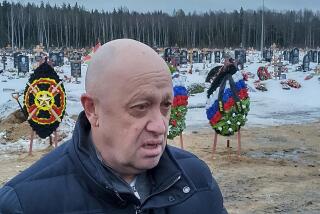Soviet Prime Minister Threatens to Quit : Kremlin: An irate Ryzhkov rebukes radical legislators. ‘The government can make mistakes, but it is not corrupt,’ he says.
- Share via
MOSCOW — Soviet Prime Minister Nikolai I. Ryzhkov, angrily rejecting allegations that he had links to illicit arms deals, warned Wednesday that he would quit if radicals continued their harsh attacks on his government.
Ryzhkov, shaking with rage, told the Congress of People’s Deputies that the radicals had so undermined his government with their unremitting criticism that it is losing its authority and even its sense of direction.
“There is a wholesale smearing of everything that the government is doing,” Ryzhkov said, complaining that it is now impossible to open a newspaper, read a magazine or watch television without finding more charges against his government.
“Under these circumstances, it is becoming impossible to work. If the atmosphere around the government does not change, we will resign,” he said.
Ryzhkov, 60, an industrial manager who has been prime minister for the last five years, was replying to allegations in a speech by Anatoly A. Sobchak, a law school dean from Leningrad. Sobchak asserted that Ryzhkov’s signature was on a document setting up a cooperative enterprise that was caught recently trying to ship 14 new T-72 tanks overseas. It was later found to have exported strategic materials as well.
“The government can make mistakes, but it is not corrupt,” Ryzhkov declared, his voice quivering with anger. “I categorically reject these accusations.”
He said that the cooperative, known by its Russian initials, ANT, had been set up in 1987 with government assistance to export scrap material from the defense industry and import goods in short supply here.
“We wanted to sell off surplus production, and what’s wrong with that?” Ryzhkov demanded. “Who could have known (in advance) about the fate of these tanks?”
Sobchak, who is a staunch defender of the cooperative movement as the spearhead of private enterprise in the Soviet Union, alleged that, in fact, ANT was really a secret state agency that was exporting billions of dollars worth of strategic materials, as well as weapons, and that most of the profits were disappearing into foreign bank accounts.
“This cooperative was only able to conduct activity because it was approved by the government,” Sobchak declared. “Ryzhkov’s signature was on the document.”
The exchange reflected the fraying of the country’s political nerves as President Mikhail S. Gorbachev’s economic reforms have failed to bring the promised results.
Only a year ago, Ryzhkov was widely regarded as extremely competent and even a potential rival to Gorbachev. But, as the general manager of the country’s economy, Ryzhkov has become the target for more and more criticism.
Until the establishment of the Congress of People’s Deputies a year ago, Soviet ministers were rarely called to account, even when corrupt, except through the Communist Party. Lawmakers today, however, take their duties with increasing seriousness and see the legislative branch as an equal of the executive.
Sobchak, who was scolded by Gorbachev for “an undignified, tactless and out-of-place speech,” called for a parliamentary investigation and predicted that this would lead directly to Ryzhkov and several of his ministers.
The ANT cooperative’s deals have become the subject of numerous articles in the Soviet press over the last month. Ministers in charge of the defense, aviation and radio industries were reprimanded in January after the KGB, the Soviet security agency, uncovered the tank deal.
ANT was to import personal computers and condoms with the proceeds from the sale.
More to Read
Sign up for Essential California
The most important California stories and recommendations in your inbox every morning.
You may occasionally receive promotional content from the Los Angeles Times.













